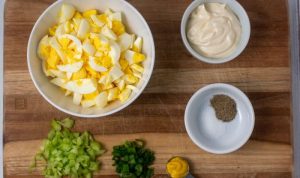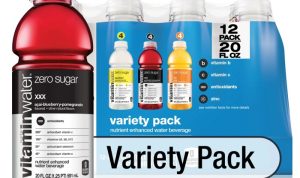Comparison to Other Breakfast Foods: Pop Tarts Blueberry Nutrition Facts
Pop tarts blueberry nutrition facts – Let’s delve into a comparative analysis of Pop-Tarts Blueberry against other popular breakfast choices. Understanding the nutritional differences is key to making informed decisions about what fuels your mornings. We’ll examine sugar, fiber, and protein content to see how Pop-Tarts stack up against the competition.Pop-Tarts Blueberry, while undeniably convenient and tasty, presents a different nutritional profile compared to cereals, yogurts, and toast with jam.
This comparison will highlight the strengths and weaknesses of each option, allowing you to select the breakfast best suited to your dietary needs and preferences.
Nutritional Comparison of Breakfast Foods
The following table summarizes the key nutritional differences between Pop-Tarts Blueberry and other common breakfast choices. Note that nutritional values can vary slightly depending on brand and specific product. These figures represent average values for readily available options.
| Food | Serving Size | Sugar (g) | Fiber (g) | Protein (g) |
|---|---|---|---|---|
| Pop-Tarts Blueberry (1 pastry) | 40g | 12-14 | 1-2 | 2-3 |
| Cereal (1 cup, depending on brand) | ~30g | 8-15 | 2-5 | 3-5 |
| Yogurt (1 cup, plain, nonfat) | ~245g | <5 | 0-1 | 10-15 |
| Toast with Jam (2 slices whole wheat, 1 tbsp jam) | ~100g | 10-15 | 3-4 | 4-6 |
Advantages and Disadvantages of Each Breakfast Option
It’s important to consider both the benefits and drawbacks of each breakfast option.
- Pop-Tarts Blueberry: Advantages include convenience and taste. Disadvantages include high sugar content and relatively low fiber and protein.
- Cereal: Advantages include various options for nutritional content (fortified cereals offer higher vitamins and minerals), relatively low cost, and convenience. Disadvantages can include high sugar content in some brands, and low protein in many options.
- Yogurt: Advantages include high protein content, good source of calcium, and relatively lower sugar (especially plain yogurt). Disadvantages include potential for added sugar in flavored varieties, and can be more expensive than other options.
- Toast with Jam: Advantages include moderate fiber content, provides carbohydrates for energy, and relative ease of preparation. Disadvantages include potential for high sugar content depending on the type of jam used, and lower protein compared to yogurt.
Ingredient Analysis
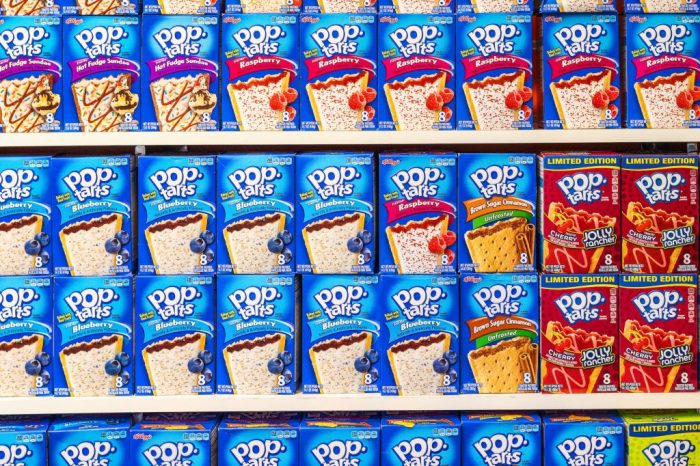
Pop-Tarts Blueberry, a beloved breakfast pastry, boasts a simple yet impactful ingredient list. Understanding these components allows us to appreciate their contribution to the overall nutritional profile, both positive and negative. This analysis will categorize the ingredients and discuss their effects on taste, texture, and nutritional value.
The primary ingredients fall into several key categories: grains, sugars, fats, and minor additives. These interact to create the familiar Pop-Tart experience, but their impact on health should be considered within the context of a balanced diet.
Grain Components
Enriched flour forms the base of the Pop-Tart. This flour, typically wheat flour, is enriched with added iron and B vitamins to boost its nutritional content compared to unenriched flour. However, it is still predominantly a refined carbohydrate, meaning it is quickly digested, leading to a rapid spike in blood sugar. Cornstarch also contributes to the pastry’s texture, providing a slightly chewy consistency.
The combination of these refined grains provides a quick energy source, but lacks the fiber and complex carbohydrates found in whole grains, which contribute to sustained energy and improved digestive health.
Sugar Content
Sugar is a significant component of Pop-Tarts Blueberry. High-fructose corn syrup and sugar are listed prominently. These contribute to the sweetness and overall palatability of the product. However, excessive sugar consumption is linked to various health concerns, including weight gain, tooth decay, and increased risk of chronic diseases. The high sugar content should be considered when integrating Pop-Tarts into a balanced diet.
Fat Composition
Fats in Pop-Tarts Blueberry primarily come from partially hydrogenated soybean oil and palm oil. These fats contribute to the pastry’s flaky texture and shelf stability. Partially hydrogenated oils contain trans fats, which have been linked to increased risk of heart disease. While the amount in a single Pop-Tart may be relatively low, regular consumption of foods containing trans fats should be limited.
The combination of fats and sugars also contributes significantly to the high caloric density of the product.
Additives and Allergens
Pop-Tarts Blueberry contains various additives to enhance flavor, texture, and shelf life. These may include artificial colors, preservatives, and emulsifiers. It is crucial to carefully check the specific ingredient list for potential allergens, as it may contain soy, wheat, and milk derivatives. Individuals with allergies should always exercise caution and review the label thoroughly before consumption. The presence of these additives raises concerns about potential long-term health effects for some individuals, prompting the need for mindful consumption.
Impact of Serving Size
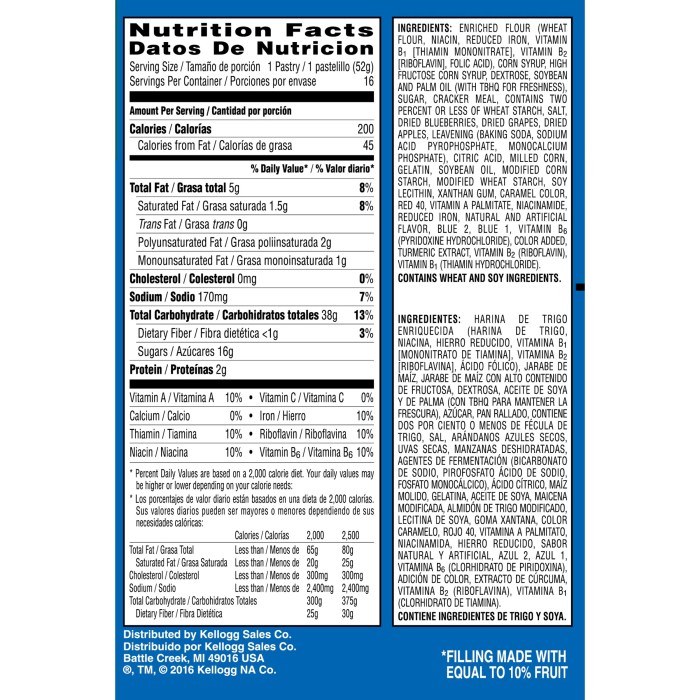
Understanding the impact of serving size is crucial when enjoying Pop-Tarts Blueberry, or any processed food for that matter. While a single Pop-Tart might fit within a balanced breakfast, consuming multiple servings significantly alters your daily nutritional intake, potentially leading to undesirable health consequences. Let’s explore how exceeding the recommended serving size can affect your well-being.Consuming multiple Pop-Tarts Blueberry significantly increases your intake of sugar, saturated fat, and refined carbohydrates.
This can lead to several negative health impacts. For example, exceeding the recommended serving size could contribute to weight gain due to the high caloric density of the pastry. Increased sugar intake is linked to elevated blood sugar levels, potentially increasing the risk of type 2 diabetes. Furthermore, the high saturated fat content can negatively impact cholesterol levels, increasing the risk of heart disease.
Consider a scenario where someone consumes three Pop-Tarts instead of one; their daily sugar intake could easily exceed recommended limits, impacting their energy levels and overall health.
Effects on Various Health Markers
The excessive consumption of Pop-Tarts, beyond the recommended serving size, can negatively affect several key health markers. Increased sugar intake directly impacts blood glucose levels, leading to potential spikes and crashes in energy throughout the day. This can result in feelings of fatigue, irritability, and difficulty concentrating. High saturated fat intake contributes to elevated LDL (“bad”) cholesterol, increasing the risk of cardiovascular diseases.
The sugary sweetness of Pop-Tarts blueberry filling always felt like a guilty pleasure, a quick hit of carbohydrate comfort. But comparing its nutritional profile to, say, logan’s nutrition facts , which I was researching for my nephew, really put things into perspective. The stark difference highlighted how deceptively simple those seemingly innocent blueberry pastries truly are, making me reconsider my next sugary snack.
The lack of significant fiber and micronutrients in multiple Pop-Tarts can also lead to digestive issues and nutrient deficiencies, potentially affecting overall health and well-being. For instance, consistently consuming more than one Pop-Tart per day might contribute to a deficiency in essential vitamins and minerals that are usually obtained from fruits, vegetables, and whole grains.
Importance of Adhering to Suggested Serving Sizes
Adhering to suggested serving sizes is paramount for maintaining a balanced diet and promoting overall health. Portion control is a cornerstone of a healthy lifestyle, helping to regulate calorie intake, limit the consumption of unhealthy fats and sugars, and ensure a balanced intake of essential nutrients. By sticking to the recommended serving size, individuals can better manage their weight, reduce the risk of chronic diseases, and maintain consistent energy levels throughout the day.
This mindful approach to food consumption prevents the overconsumption of processed foods and promotes a healthier relationship with food. Ignoring serving size recommendations can easily lead to an imbalance in daily nutrient intake, potentially compromising overall health and well-being.
Health Claims and Marketing
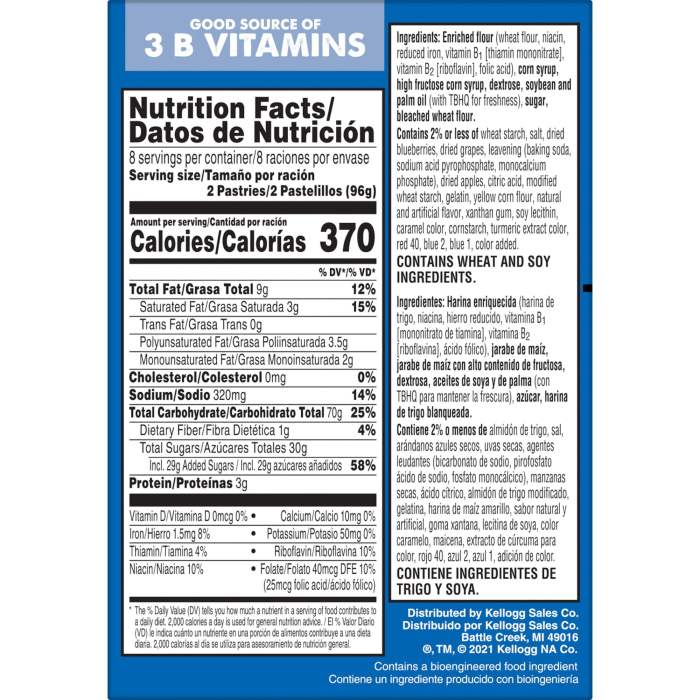
Pop-Tarts Blueberry, like many processed breakfast foods, relies heavily on marketing to attract consumers. Understanding the health claims associated with this product and evaluating their accuracy against the nutritional facts is crucial for making informed food choices. This analysis will dissect the marketing strategies employed and assess their alignment with the product’s actual nutritional profile.Pop-Tarts Blueberry marketing often emphasizes convenience and a perception of sweetness associated with a “quick breakfast.” However, the packaging rarely, if ever, highlights the significant sugar content or the relatively low nutritional value compared to other breakfast options.
The imagery frequently used—bright colors, appealing cartoon characters, or depictions of happy families enjoying the product—reinforces a positive association that might not accurately reflect the product’s impact on health. This creates a potential for misleading consumers regarding the product’s overall nutritional profile.
Marketing Strategies and Their Accuracy, Pop tarts blueberry nutrition facts
The primary marketing strategy for Pop-Tarts Blueberry focuses on convenience and taste. Advertisements often portray Pop-Tarts as a quick and easy breakfast solution for busy mornings. While this is true regarding preparation time, it overlooks the significant sugar content and lack of essential nutrients. The “fruity” aspect is emphasized, suggesting a healthier option compared to other sugary snacks, but this is deceptive when considering the refined sugar content significantly outweighs the nutritional benefits of the limited blueberry filling.
The marketing skillfully avoids explicit claims of health benefits, relying instead on implied associations with convenience and taste to appeal to consumers. This subtle approach makes it challenging for consumers to critically evaluate the product’s nutritional value.
Potential for Misleading Marketing
The potential for misleading marketing is significant. The vibrant packaging and appealing imagery create a positive sensory experience, leading consumers to subconsciously associate the product with positive feelings. This positive association is further amplified through advertising campaigns that focus on happy families and convenient breakfasts, effectively masking the less appealing nutritional reality. For example, a typical Pop-Tart contains a significant amount of added sugar, far exceeding the recommended daily intake for many individuals, particularly children.
This high sugar content contributes to potential health problems like weight gain, tooth decay, and increased risk of chronic diseases. Yet, this crucial information is often downplayed or omitted from marketing materials, leaving consumers with an incomplete picture of the product’s true nutritional impact. The emphasis on “blueberry” flavor also creates a false sense of nutritional value, as the actual blueberry content is minimal compared to the amount of refined sugar and processed ingredients.
FAQ Section
Are Pop-Tarts Blueberry gluten-free?
Nope, they contain wheat. So, sadly, they’re off the menu for those with gluten sensitivities.
How much sugar is REALLY in one Pop-Tart?
A concerning amount. Check the nutrition label – it’ll likely shock you. It’s enough to make your teeth hurt just reading it.
Can I eat Pop-Tarts every day?
Technically, yes. Should you? Probably not. Your dentist will thank you for choosing a more balanced breakfast occasionally.
Are Pop-Tarts a good source of fiber?
Let’s just say they’re not exactly bursting with fiber. You’ll find more in a stalk of broccoli, for sure.




